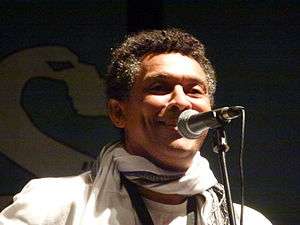Mário Lúcio (singer)
For the Brazilian footballer, see Mário Lúcio
| Mário Lúcio (singer) | |
|---|---|
|
Mario Lucio at the FMM Festival das Musicas do Mundo in Sines, Portugal in 2011. | |
| Background information | |
| Born |
October 21, 1964 Tarrafal on Santiago, Cape Verde |
| Occupation(s) | singer, composer, actor |
Mário Lúcio or Izé (born October 21, 1964) is a Capeverdean singer, composer and a painter. Since 2011, he is the Capeverdean Minister of Culture.
Biography
Mário Lúcio lost his father when he was 12. At age 15, he and his seven siblings lost his mother. He lived in the barrack buildings of the Cape Verdean forces in his hometown under the care of the military. After finishing the secondary school, he received a state scholarship and attended the high school, the Instituto Superior de Educação (ISE, now part of the University of Cape Verde) in the capital city of Praia to study. In 1984, he received a scholarship by the Cuban government in Havana where he studied and graduated six years later. He returned to his country where he practiced law. Between 1996 and 2001, he was member of the Cape Verdean parliament.
He later founded the band Simentera. His ideas received an invitation by his government and became author of the Cape Verdean Musical Projects for Expo 92 in Seville and Expo 98 in Lisbon. He is a founder and director of Quintal da Música Cultural Association, a private cultural center featuring traditional music. As a composer, he was member of SACEM (Societé française des Droits d'auteur) with compositions that Cesária Évora and other Cape Verdean artists recorded. He is the permanent composer of the Raiz di Polon Company, the only contemporary dance formation in the islands. In 1996, he recorded an album Nôs Morna, Ildo Lobo's first solo album. He composed at a request of the Porto European Culture Capital on the soundtrack of the play Adão e as Sete Pretas de Fuligem, performed by João Branco. He later attended at Fesquintal de Jazz, the Cape Verde International Jazz Festival whom he founded, several concerts in Brazil and Cuba as well as some European Countries and the African mainland, his notable appearance was the 2011 FMM Festival das Musicaus do Mundo in Sines, Portugal.[1]
He is also a painter and participate in some of his exhibitions. He also appeared in poetry, and theater. In 2009, he wrote a novel titled Testamento (Testament) published by Dom Quixote, his recent noval won the Carlos de Olvieira Award and was a bestseller in Portugal.[2]
Works
- Nascimento de Um Mundo ["Born in a World"] (poetry, 1990)
- Sob os Signos da Luz (poetry, 1992)
- Para Nunca Mais Falarmos de Amor (poetry, 1999)
- Os Trinta Dias do Homem mais Pobre do Mundo ["30 Days of More Poverty in the World on Man"] (fiction, 2000 - Winner of the 1st Portuguese Language Bibliographical Fund Award)
- Adão e As Sete Pretas de Fuligem (theater, 2001).
References
- ↑ "Information on the musician at Malagueta Music".
- ↑ "Mário Lúcio Sousa". Contemporary Cultural Centre in Barcelona. Retrieved 23 March 2016.
External links
- Profile of Mário Lúcio
- Video of his performance at the FMM Festival das Musicas do Mundo in Sines, Portugal in 2011
